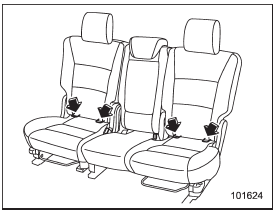Installation of child restraint systems by use of lower and tether anchorages (LATCH)
WARNING
• Child restraint systems and seatbelts can become hot in a vehicle that has been closed up in sunny weather; they could burn a small child. Check the child restraint system before you place a child in it.
• Do not leave an unsecured child restraint system in your vehicle.
Unsecured child restraint systems can be thrown around inside of the vehicle in a sudden stop, turn or accident; they can strike and injure vehicle occupants as well as result in serious injuries or death to the child.
CAUTION
When you install a child restraint system, follow the manufacturer’s instructions supplied with it. After installing the child restraint system, check to ensure that it is held securely in position. If it is not held tight and secure, the danger of your child suffering personal injury in the event of an accident may be increased.
Some types of child restraint systems can be installed in a rear seating position of your vehicle without use of the seatbelts.
Such child restraint systems are secured to the dedicated anchorages provided on the vehicle body.
The lower and tether anchorages are sometimes referred to as the LATCH system (Lower Anchors and Tethers for CHildren).


The second-row seat has four lower anchorages (bars) and three upper anchorages (tether anchorages) for accommodating such child restraint systems.

The lower anchorages (bars) are used for installing a child restraint system only on the window-side seating positions. For each window-side seating position, two lower anchorages are provided.
Each lower anchorage is located where the seat cushion meets the seatback.

The tether anchorages (upper anchorages) are provided for all the seating positions of the second-row seat.

On each outboard second-row seat, you
will find marks “  ” at the bottom of
” at the bottom of
the
seatback.
Each lower anchorage is located where the seat cushion meets the seatback.
CAUTION
When you install a child restraint system, follow the manufacturer’s instructions supplied with it. After installing the child restraint system, check to ensure that it is held securely in position. If it is not held tight and secure, the danger of your child suffering personal injury in the event of an accident may be increased.

1. Slide the seat or seat pair to its rearmost position.
2. Make the clearance between the seat cushion and seatback a little wider to locate the two anchorages (bars) for the position where you want to install the child restraint system.

3. While following the instructions supplied
by the child restraint system manufacturer,
connect the lower hooks onto the
lower anchorages located at “  ”
”
marks on
the bottom of the seatback. When the
hooks are connected, make sure the
adjacent seatbelts are not caught.

4. If your child restraint system is a flexible attachment type (which uses tether belts to connect the child restraint system properly to the lower anchorages), while pushing the child restraint into the seat cushion, pull both left and right lower tether belts up to secure the child restraint system firmly by taking up the slack in the belt.
5. Connect the top tether hook to the tether anchorage and firmly tighten the tether. For information on how to set the top tether, refer to “Top tether anchorages”.

6. Before seating a child in the child restraint system, try to move seat back and forth and left and right to verify that it is held securely in position.
7. To remove the child restraint system, follow the reverse procedures of installation.
If you have any question concerning this type of child restraint system, ask your SUBARU dealer.
